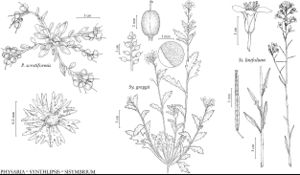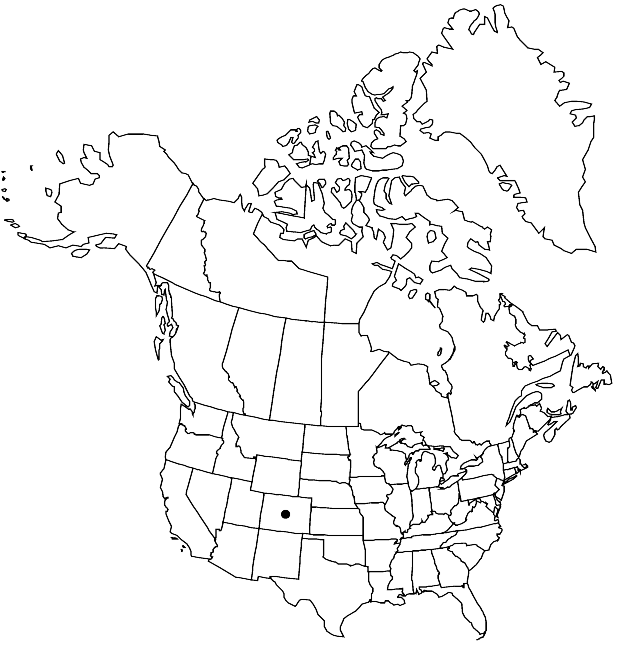Physaria scrotiformis
Novon 17: 376, fig. 1. 2007.
Perennials; (diminutive); caudex simple or branched, (buried, with thatch of persistent leaf bases distally); (appearing silvery gray-green to silvery purple), densely pubescent, trichomes usually 5 or 6 (rarely 7)-rayed, rays bifurcate or incompletely so, (relatively short, stout, umbonate, moderately tuberculate to nearly smooth, lower layer smoother). Stems 1–5 from base, prostrate to slightly decumbent, (arising laterally, also erect or ascending from tuft of basal leaves, unbranched, purple-green), 0.08–0.3 dm. Basal leaves: (petiole slightly winged); blade oblanceolate, elliptic, or rhombic, (mostly flat, sometimes somewhat folded), 0.6–2.7 cm, (base tapering to petiole), margins entire, (apex rounded to rounded-acute). Cauline leaves: (3–7, shortly petiolate or sessile); blade elliptic to oblanceolate, 0.3–0.5 cm, margins entire. Racemes crowded, (ca. 3–7 fruits). Fruiting pedicels (ascending, straight), 1.8–3.4 mm. Flowers: sepals (greenish yellow), linear-triangular, 3.7–5 mm, (lateral pair subsaccate); petals oblanceolate to narrowly obovate, 4.5–9 mm. Fruits (shortly stipitate, purple or greenish purple in age), slightly didymous, ovoid to obpyriform, 3–5 mm (wider than long, base rounded-obtuse, apex rounded, flattened, or slightly emarginate); valves (inflated, slightly wider than replum), pubescent, trichomes scattered; replum obovate to orbicular-obdeltate, apex rounded, obtuse, or truncate; septum complete or medially small-perforate; ovules 4–6(–8) per ovary; style 2–3.6 mm. Seeds relatively plump, (ovate to suborbicular, usually rounded on one side, ± flat or concave on the other, not mucilaginous when wetted).
Phenology: Flowering Jun-early Jul.
Habitat: Tundra areas with islands of Engelmann spruce on Leadville limestone, amidst limestone cobbles and gravel
Elevation: 3500-3700 m
Discussion
Physaria scrotiformis is known only from La Plata County.
Selected References
None.

